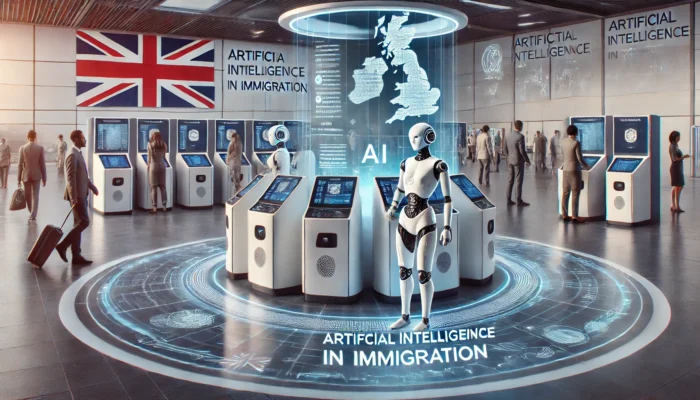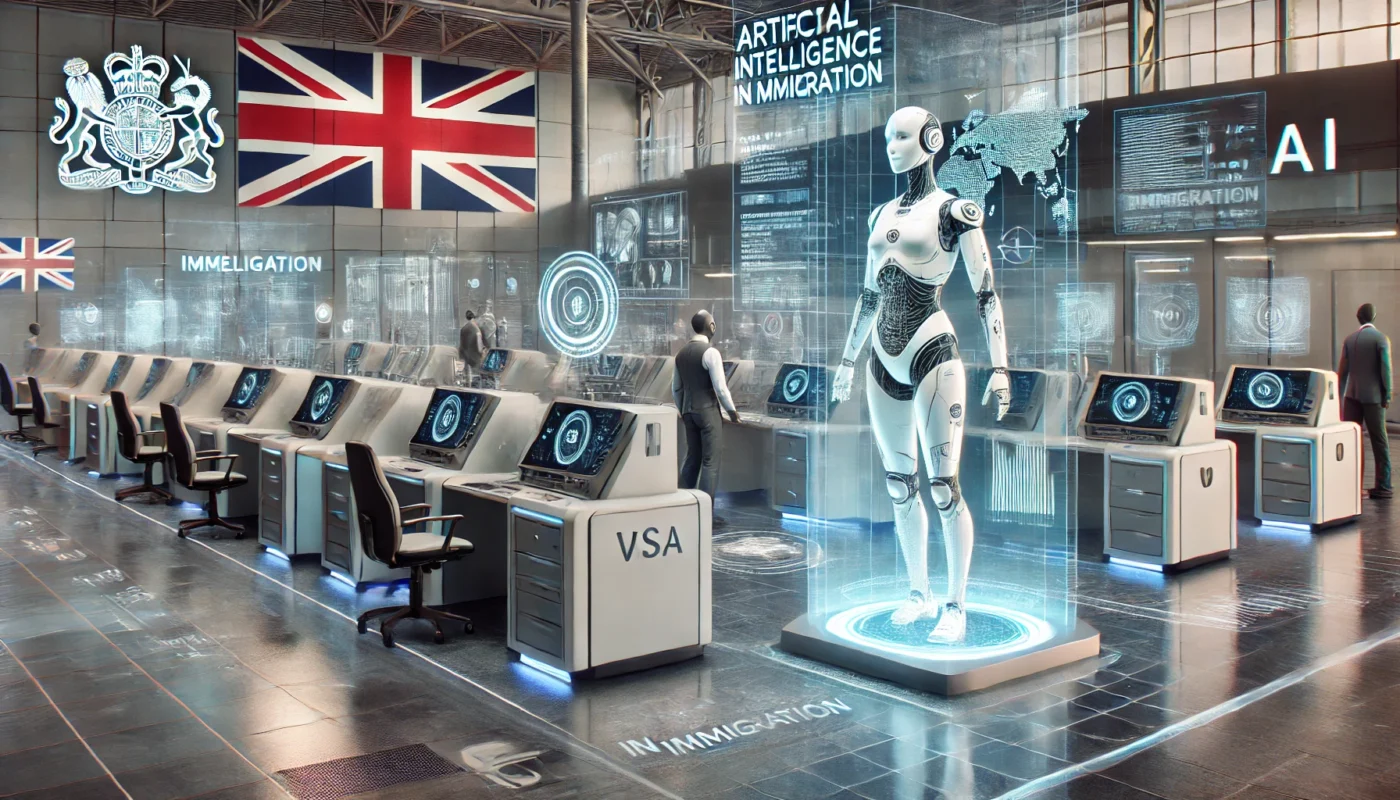Introduction | The Role of AI in Modern Immigration
Artificial Intelligence in Immigration is revolutionizing industries worldwide, and immigration is no exception. Governments, legal institutions, and private companies are increasingly leveraging AI technologies to streamline Artificial Intelligence in Immigration, improve efficiency, and enhance decision-making. From application processing to fraud detection, AI is reshaping how immigration systems operate, promising both benefits and challenges.
How AI is Being Used in Immigration Systems
Automated Application Processing
AI-powered tools are now widely used to automate visa and immigration applications, reducing manual labor and accelerating processing times. Applicants can now complete forms online, while Artificial Intelligence in Artificial Intelligence in Immigration systems automatically validate information, check for inconsistencies, and flag potential errors before submission.
- Example: The UK’s Home Office uses AI algorithms to manage high volumes of visa applications, significantly reducing wait times for standard visa categories.
Fraud Detection and Risk Assessment
Artificial Intelligence in Immigration systems are highly effective in identifying fraudulent activities by analyzing patterns, behaviors, and data inconsistencies that human officers might miss. These systems assess applicants’ backgrounds, travel histories, and documentation to detect discrepancies.
- AI Benefits:
- Reduces visa fraud and illegal entry.
- Enhances national security by identifying high-risk applicants.
Real-Time Data Analysis for Policy Development
Governments and immigration authorities use Artificial Intelligence in Immigration to analyze large datasets in real-time, helping them understand migration patterns, predict future trends, and develop data-driven policies. This capability ensures Artificial Intelligence in Immigration policies are more adaptable and responsive to global changes.
Benefits of Artificial Intelligence in Immigration
Artificial Intelligence (AI) offers numerous advantages in the field of Artificial Intelligence in Immigration, transforming how applications are processed, fraud is detected, and policies are developed. One of the most significant benefits is efficiency. AI-driven systems streamline the application process by automating tasks like data verification and document checks, which drastically reduces processing times. Artificial Intelligence in Immigration allows immigration departments to handle larger volumes of applications without compromising accuracy or speed.
Another advantage is the enhanced accuracy that AI brings to decision-making. By analyzing vast amounts of data, AI systems can identify inconsistencies or errors that may be missed by human officers, leading to more precise outcomes. This reduces the chances of wrongful visa rejections and ensures applicants receive fair treatment.
AI also plays a crucial role in fraud detection. Advanced algorithms can detect patterns and anomalies that indicate fraudulent activity, improving national security and safeguarding Artificial Intelligence in Immigration systems from misuse. Additionally, AI’s predictive capabilities allow governments to develop data-driven policies, making immigration systems more adaptable to global trends and future challenges.
Lastly, cost savings is another key benefit. Automation reduces the need for extensive manual labor, cutting administrative expenses and freeing up resources that can be allocated to more complex immigration issues. AI makes immigration services more affordable and accessible for applicants while maintaining high standards of service quality.

Challenges and Ethical Considerations
Despite its advantages, the use of AI in immigration raises several concerns:
- Bias and Discrimination
Artificial Intelligence in Immigration systems can inadvertently reflect biases present in the data they are trained on, leading to unfair treatment of certain applicants based on nationality, ethnicity, or socioeconomic background.
- Privacy Concerns
The use of Artificial Intelligence in Immigration involves collecting and analyzing vast amounts of personal data, raising concerns about how this information is stored, used, and protected.
- Lack of Transparency
Artificial Intelligence in Immigration algorithms are often considered “black boxes,” meaning their decision-making processes are not always transparent. Artificial Intelligence in Immigration Applicants may not fully understand why their visa applications were accepted or denied.
Artificial Intelligence in Immigration: 2024 vs. 2025
| Feature | 2024 | 2025 |
|---|---|---|
| Application Processing | Partially automated for standard visas | Fully automated for most visa categories |
| Fraud Detection | Pattern-based detection | Predictive analytics with machine learning |
| Decision Transparency | Limited applicant insights | Improved transparency through AI explainability tools |
| Data Privacy | Standard data protection measures | Advanced encryption and decentralized data storage |
The Future of Artificial Intelligence in Immigration
Looking ahead, Artificial Intelligence in Immigration will continue to play a pivotal role in reshaping Artificial Intelligence in Immigration processes globally. Governments are likely to implement more advanced machine learning models to predict migration flows, automate border controls, and improve integration services for newcomers.
Additionally, private immigration firms like Primus Solicitors are increasingly incorporating Artificial Intelligence in Immigration tools to enhance client services, offering faster, more accurate advice and support for visa applications.
FAQs About Artificial Intelligence in Immigration
- How does Artificial Intelligence in Immigration improve visa application processing?
Artificial Intelligence in Immigration automates repetitive tasks, such as data entry and document verification, reducing processing times and minimizing errors. - Can AI replace immigration officers entirely?
No, Artificial Intelligence in Immigration is a tool to assist immigration officers by handling routine tasks, but human oversight is still necessary for complex cases and ethical considerations. - Is Artificial Intelligence in Immigration used in UK immigration services?
Yes, the UK Home Office uses AI to process applications, detect fraud, and develop Artificial Intelligence in Immigration policies based on real-time data analysis. - How does Artificial Intelligence in Immigration help in detecting visa fraud?
AI analyzes patterns in applicant data, comparing it to historical records to identify inconsistencies or suspicious activities. - What are the privacy concerns with Artificial Intelligence in Immigration?
Artificial Intelligence in Immigration systems require large amounts of personal data, raising concerns about data security, storage, and potential misuse.
Conclusion: Embracing the Future of Artificial Intelligence in Immigration
Artificial Intelligence in Immigration is undoubtedly transforming the Artificial Intelligence in Immigration landscape, offering faster, more accurate, and cost-effective solutions. However, it also presents challenges that require careful consideration, particularly in terms of ethics, transparency, and privacy.
At Primus Solicitors, we stay at the forefront of these technological advancements, ensuring our clients benefit from the latest innovations while navigating the complexities of Artificial Intelligence in Immigration law.
for more information contact us now!


